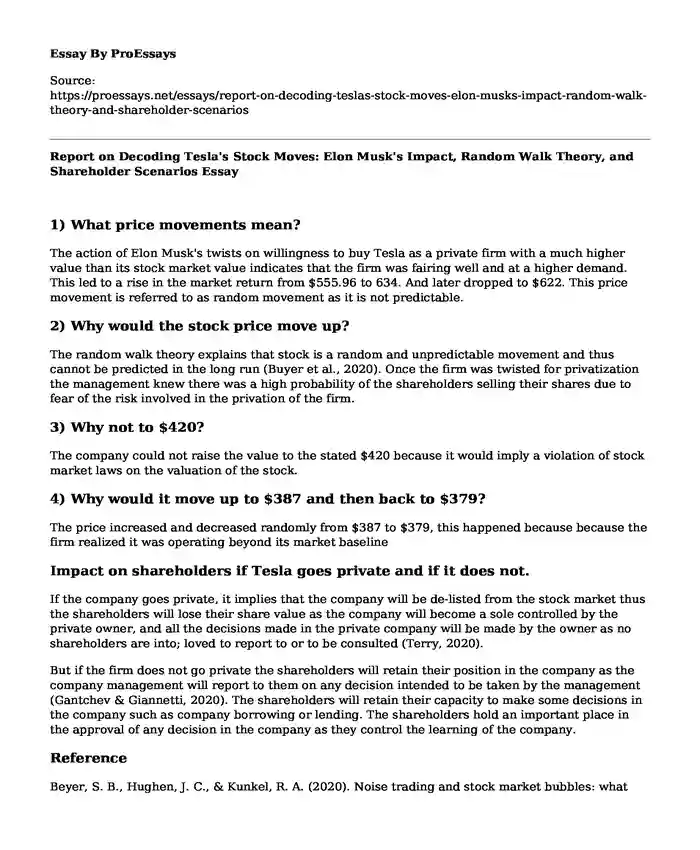1) What price movements mean?
The action of Elon Musk's twists on willingness to buy Tesla as a private firm with a much higher value than its stock market value indicates that the firm was fairing well and at a higher demand. This led to a rise in the market return from $555.96 to 634. And later dropped to $622. This price movement is referred to as random movement as it is not predictable.
2) Why would the stock price move up?
The random walk theory explains that stock is a random and unpredictable movement and thus cannot be predicted in the long run (Buyer et al., 2020). Once the firm was twisted for privatization the management knew there was a high probability of the shareholders selling their shares due to fear of the risk involved in the privation of the firm.
3) Why not to $420?
The company could not raise the value to the stated $420 because it would imply a violation of stock market laws on the valuation of the stock.
4) Why would it move up to $387 and then back to $379?
The price increased and decreased randomly from $387 to $379, this happened because because the firm realized it was operating beyond its market baseline
Impact on shareholders if Tesla goes private and if it does not.
If the company goes private, it implies that the company will be de-listed from the stock market thus the shareholders will lose their share value as the company will become a sole controlled by the private owner, and all the decisions made in the private company will be made by the owner as no shareholders are into; loved to report to or to be consulted (Terry, 2020).
But if the firm does not go private the shareholders will retain their position in the company as the company management will report to them on any decision intended to be taken by the management (Gantchev & Giannetti, 2020). The shareholders will retain their capacity to make some decisions in the company such as company borrowing or lending. The shareholders hold an important place in the approval of any decision in the company as they control the learning of the company.
Reference
Beyer, S. B., Hughen, J. C., & Kunkel, R. A. (2020). Noise trading and stock market bubbles: what the derivatives market is telling us. Managerial Finance. https://scholar.google.com/scholar?q=related:_F6ZFvqBNuEJ:scholar.google.com/&scioq=random+movement+of+the+stock+market+shares&hl=en&as_sdt=0,5&as_ylo=2020
Gantchev, N., & Giannetti, M. (2020). The Costs and Benefits of Shareholder Democracy: Gadflies and Low-Cost Activism. https://scholar.google.com/scholar?q=related:wnPqHpuBPvUJ:scholar.google.com/&scioq=benefit+of+public+company+to+shareholders&hl=en&as_sdt=0,5&as_ylo=2020
Terry, L. (2020). How Deregulation and" I" Corporations Could Save Shareholders from Themselves: Going Private-Lite. Colo. Tech. LJ, 18, 485. https://scholar.google.com/scholar?cites=16824672342801076094&as_sdt=2005&sciodt=0,5&hl=en
Cite this page
Report on Decoding Tesla's Stock Moves: Elon Musk's Impact, Random Walk Theory, and Shareholder Scenarios. (2024, Jan 09). Retrieved from https://proessays.net/essays/report-on-decoding-teslas-stock-moves-elon-musks-impact-random-walk-theory-and-shareholder-scenarios
If you are the original author of this essay and no longer wish to have it published on the ProEssays website, please click below to request its removal:
- Research Paper on Mark Zuckerberg
- Critical Issues in Healthcare - Essay Sample
- Essay Sample on Pleading in Prosecution: Pros and Cons of Plea Bargaining
- Essay Example on Construction of HS2 Curzon Street Station to Start April 2020
- Essay Example on Adapting to Survive: Managing Change in an Organization
- Paper Sample on Diversify Investment: Corporate Strategies for Risk Management
- Free Essay Example on Empowering for Nurses







